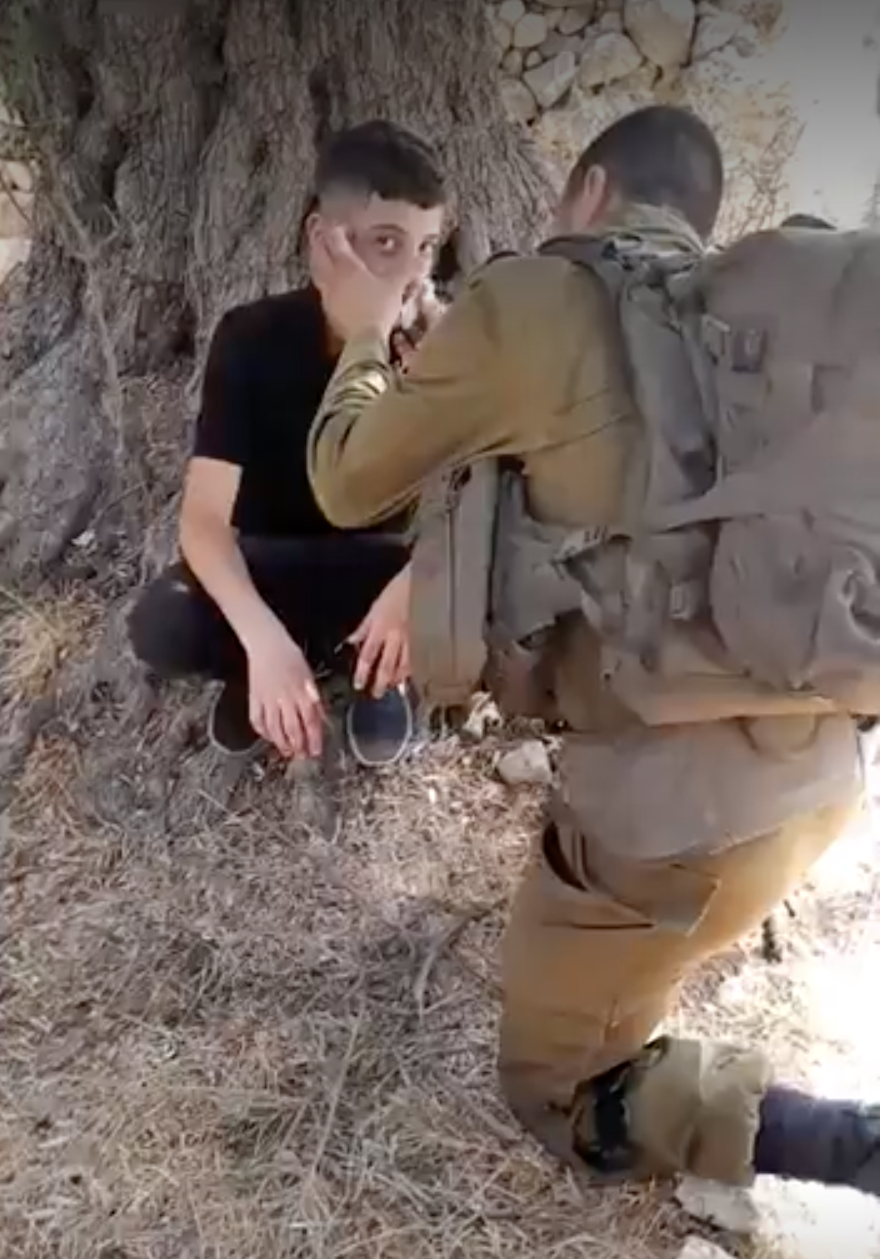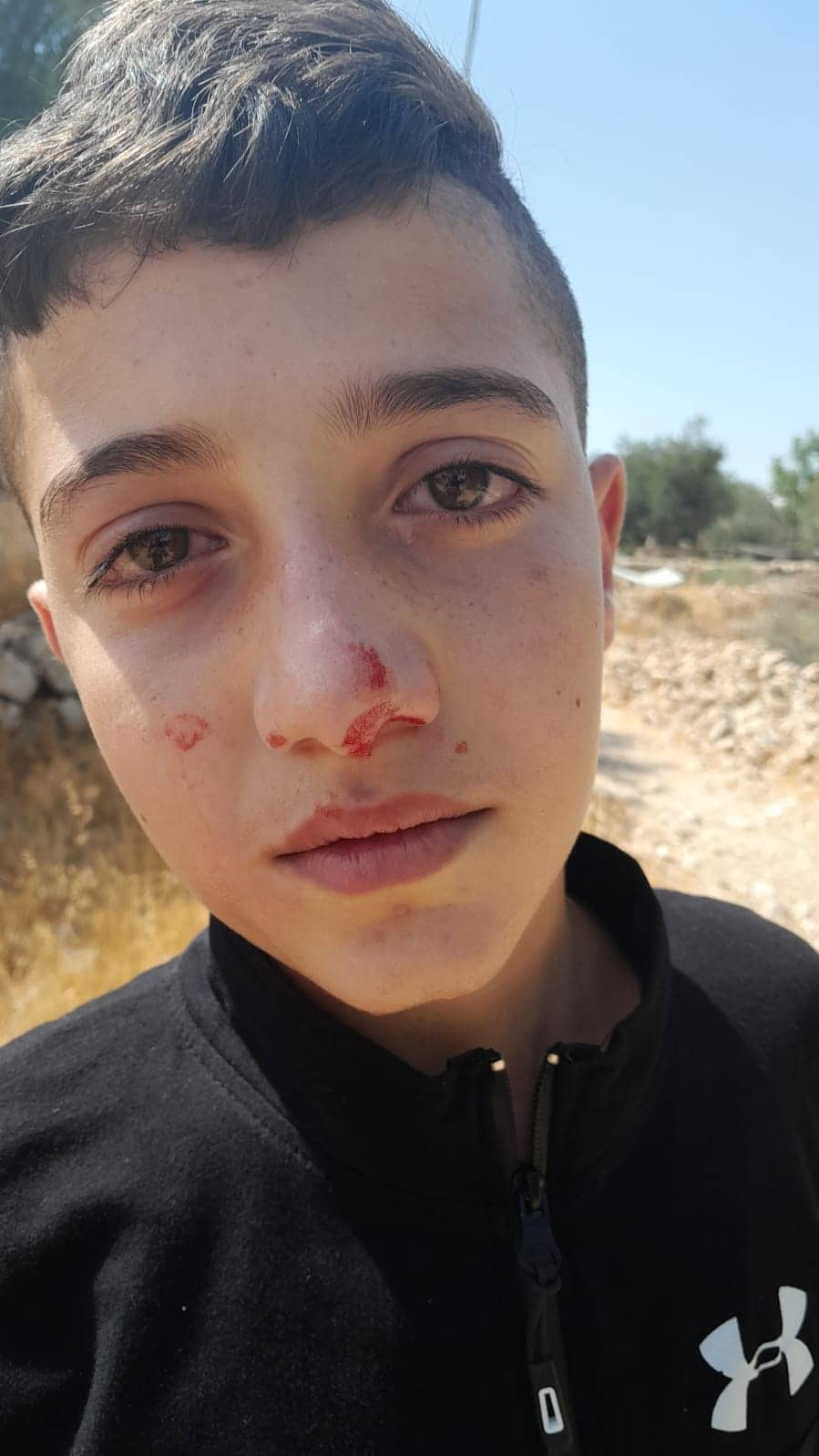On Monday, 29 August 2022, at around 2:30 P.M., Islam a-Tamimi (13) was walking home in the neighborhood of Tel Rumeidah, in the city center of Hebron. As he was making his way through an olive grove, he came across a settler who was about 18 years old and armed with a handgun. He phoned his father, Sharif a-Tamimi, at which point the settler ran over to him, punched him in the face, slapped him twice and then ran towards a nearby military post. Sharif a-Tamimi, who heard his son crying over the phone, ran to the spot along with Islam’s grandmother. Soldiers, apparently sent by the settler, also arrived and began shouting at Isalm’s relatives who were gathering there. When the soldiers noticed Islam was bleeding, one of them gave him first aid. The soldiers told the family they had not seen the assault on the security cameras and the settler had fled from the post. They said they would arrest him if he returned. The family called the police, and after Islam told the officers what happened, they suggested the family go to the police station to file a complaint.
The next morning, Sharif a-Tamimi went to the police station in the settlement of Kiryat Arba with his son. They were kept waiting outside for about four hours before being let into the station to file the complaint. The investigator who took it did not speak Arabic, and it is unclear how much of what they were saying he understood.
The assault on Islam a-Tamimi is not an isolated incident. It is one of many acts of settler violence B’Tselem has documented in Hebron.

B’Tselem field researcher Manal al-Ja’bari took the testimonies of Islam and Sharif a-Tamimi on 5 September 2022:
Testimony of Islam a-Tamimi:
On Monday, 29 August 2022, at around 2:30 P.M., I was on my way home after visiting a friend in the Bab a-Zawiya area. I was walking through the olive groves, because it’s cooler under the trees. Suddenly, I saw a settler I know from the area, who’s about 18 years old. He was about 100 meters away from me. He came towards me holding a gun. I was afraid he was going to attack me and called my dad to tell him what was going on. While I was on the phone with him, the settler came closer and punched me hard in the nose, and then slapped me hard on the face several times. I felt dizzy and my nose started to bleed. The settler ran towards a military base and called out to the soldiers.
In the meantime, my father and grandmother came, probably because my dad heard me screaming on the phone when I was attacked. Right after that, soldiers suddenly showed up. I don’t know how many. They ran towards us with their weapons drawn, looking angry. The settler must have told them we attacked him. My dad put his hands up and tried to calm the soldiers down. He explained to them that the settler had attacked me. The soldiers saw me bleeding and then they understood I’d been attacked.
My father called the Israeli police and asked for officers to come. In the meantime, one of the soldiers gave me first aid to stop the bleeding from my nose and wiped the blood off my face. My uncles and some other relatives arrived. At the same time, two Israeli police officers in blue uniforms and three other people in civilian clothing, who introduced themselves as police officers, showed up. One of the officers asked my dad what happened, and he asked me to tell them. I said the settler attacked me before running to the military base.
Islam’s father, Sharif a-Tamimi (44), a married father of three, said:
When I got there with my mother, I saw the settler running towards a military base, shouting. Islam was sitting on the ground crying, and his nose was bleeding. I saw several soldiers running towards us, yelling and waving their weapons. I put my hands up and shouted that the settler had attacked my son. The soldiers stopped yelling and one of them went over to Islam, wiped the blood off his face and tried to stop the bleeding. In the meantime, some of our relatives gathered there.
I called the Israeli police. About 15 minutes later, five people showed up, two of them in police uniforms. They asked me about what happened, so I asked Islam to tell them. A police officer took Islam’s statement hastily, and told me to go to the police station to file a complaint. I asked him to check the cameras and get the footage of my son’s assault. The officers ignored me and left the area. Then the soldiers left too. Islam was feeling dizzy and I took him home.
The next morning, at around 9:00 A.M., we went to the police station to file a complaint. I talked to an officer through the intercom. He told me to wait outside. We waited outside for about four hours. It was very hot. In the end, an officer who doesn’t speak Arabic led us into an interrogation room. He took Islam’s statement and wrote it down in Hebrew, even though Islam and I don’t know Hebrew. He knew only a handful of words in Arabic, and I barely understood him. Then we went home. No one from the police has been in touch with us since then. I don’t know if the police took the assault seriously and have done anything about it.
